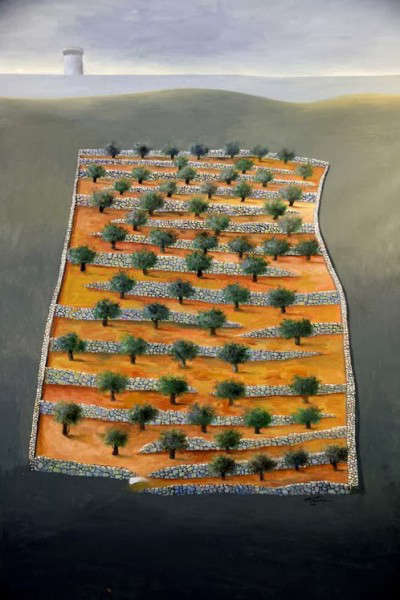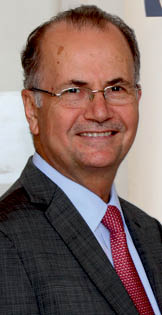The events that surrounded Israel’s creation 70 years ago deprived the Palestinian people of their homeland and dispossessed them of their lands and livelihoods. Countless Palestinian families were forced into exile, fleeing attacks and fears of violence by seeking refuge in neighboring communities and far-off, distant lands. Villages were razed, and private Palestinian land was confiscated, depriving thousands of families of their income and personal security. All in all, some 800,000 Palestinians were made refugees, dismantling the seeds of a vibrant and prosperous nation.
For Palestinians, the Nakba is an ongoing tragedy – the roots of which were laid in 1948.
The Nakba has had a devastating economic impact on Palestinians. The loss of land did not just entail the loss of homes – it also meant the seizure of orange groves, olive farms, agricultural lands, and the productive base of a nascent Palestinian economy. Established businesses were uprooted and forced off their property, throwing the futures of generations of Palestinians into jeopardy. And Palestine, a country with abundant natural resources and a rich culture and history, was robbed of its vast potential.
Palestine’s dispossession continued in 1967 following Israel’s seizure and military occupation of the West Bank, including East Jerusalem, and Gaza, which placed severe restrictions on Palestinian freedom of movement, access to natural resources, and political rights and freedoms. Against this backdrop, a series of Palestinian resistance groups were founded or reorganized, with a focus on securing Palestine’s freedom. The Palestine Liberation Organization, or PLO, became the sole legitimate representative of the Palestinian people.
Palestinian refugees continue to this day to suffer from the devastation of the Nakba. Nearly one-third of the Palestinian refugees registered with UNRWA live in 58 refugee camps across Jordan, Lebanon, the Syrian Arab Republic, the Gaza Strip, and the West Bank, including East Jerusalem, where, stripped of their UN-mandated right of return, they face daily hardships and struggle to build a secure economic future.
Israel applies a number of mechanisms to exert control over Palestinians.
With their backs against the wall, the Palestinian people, through the PLO, fought to secure their legitimate rights and national aspirations. Repeated attempts at a political settlement have failed due to Israel’s intransigence despite the PLO’s acceptance of a compromise to establish a sovereign state, with East Jerusalem as its capital and the right of return guaranteed for Palestinians, on only 22 percent of historical Palestine. Today, 70 years after the Nakba, Palestinians remain locked into a political and economic status quo that streamlines and facilitates their exploitation.
On the political front, Israel has ignored its commitments under the 1993 Oslo Accords, particularly the dismantling of its occupation of all Palestinian territory seized in 1967. Instead, Israel has continued its policy of Palestinian dispossession, strengthening its settlement enterprise while curtailing Palestine’s independence and exploiting its resources.
We must renew our pursuit of an agenda that prioritizes economic rights alongside all other liberties.
Israeli economic exploitation of the Palestinian territory that it began to occupy in 1967continued under the Paris Protocol, a 1994 interim agreement that intended to phase out Israel’s economic control of Palestine. The Paris Protocol was supposed to function as a customs envelope, bringing the import, export, and taxation of all goods within a single framework. Instead, the Paris Protocol was used by Israel as a convenient economic supplement to its ongoing occupation. Absent a political settlement, Israel has maintained control over Palestine’s borders and land, leveraging its control over imports and exports to create a captive market for its own products and exploiting land for settlement construction and expansion.
Despite these challenges, the Palestinian agenda remains unchanged: self-determination with the liberty to build a prosperous, enduring future in our homeland. To stay vigilant in defense of our future – following over 50 years of occupation, and 70 years after the Nakba – we must renew our pursuit of a political agenda that prioritizes economic rights alongside political, civil, and human rights.
Economic rights need not take a back seat until political and civil liberties are achieved. Securing our economic rights – and demanding them now – will strengthen our economic resilience and provide us with the momentum we need to sustain our national project. Economic rights include the right to an adequate standard of living, the right to secure energy access, the right to be connected with the world through telecommunications and trade, the sustainable utilization of and access to our natural resources, the right to health and education, and the right to access science and technology. These rights are endowed upon all people through the United Nations’ Universal Declaration of Human Rights and the International Covenant on Economic, Social, and Cultural Rights, and exist alongside political and civil rights.
Palestinians are not powerless in the struggle to assume and defend our economic rights in the face of an occupation that seeks to limit them. Defending our economic rights will enable our economic resilience, making us less susceptible to hostile Israeli actions and reducing our reliance on Israel for products, services, and jobs.
There are a number of steps that Palestine must take to boost its political and economic resilience, assume its citizens’ economic rights, and lay the foundations for the future.
Palestine must seek the replacement of the Paris Protocol with a new economic agreement that places Palestine and Israel’s economic cooperation on equal footing, rather than serving as a cover for Israeli control of Palestine’s economic development and activities.
A framework for the future in Palestine requires steps that boost Palestine’s resilience and grant the Palestinian people a new economic agenda. These steps include the pursuit of a new economic agenda, the building and expansion of Palestine’s public infrastructure, the catalyzing of investment in high-growth sectors, the boosting of land-preservation efforts, and investment in Palestine’s human development and innovation.
A quick look at the numbers exposes the extent of Israel’s capture of the Palestinian market and the need for a new economic arrangement. Taken together, Israeli restrictions have rendered Palestine an “import economy” – 57 percent of the GDP comes from imports, while exports stand at just 18 percent of the GDP. Further, products to and from Israel account for 63 percent of Palestinian imports and a whopping 79 percent of Palestinian exports.i The restrictions have had a particularly profound effect in Gaza, where the vast majority of farmers and traders are prohibited from exporting their produce and products or reaching the markets of the West Bank and East Jerusalem.
A new economic arrangement must grant Palestine control over its import and export polices and trade facilitation infrastructure, as well as remove restrictions on industrial and agricultural development. In order to relieve Palestine’s immediate economic pressures, a new framework must include guarantees that liberate the market to develop its public infrastructure and secure foreign direct investment.
The development of Palestine’s public infrastructure has suffered greatly under Israel’s occupation. Recent years have also seen decreased investment in Palestine’s development, due both to waning donor support and to budgetary constraints of the Palestinian government. Without a productive capital base to tax, or sufficient control over duties and revenues from private-sector activity, the Palestinian government channels most of its available public financing towards high-priority current spending, preventing Palestine from investing in the future.
Palestine must break this counterproductive cycle by mobilizing funding and securing international support for the development of critical infrastructure that enables economic resilience. This includes the development of domestic energy and power-generation capabilities, the construction of seaport and airport, modern border crossings, and the development of water resources and innovations. New models and partnerships that prioritize private-sector participation will help to boost the sustainability of Palestine’s infrastructural development while creating employment opportunities.
To begin, more resources should be channeled towards local energy and power generation. Palestine relies heavily on foreign energy suppliers, particularly Israel, which in 2017 provided 99 percent of the total electricity supply in the West Bank and 64 percent of the total supply in Gaza.ii Expanding local power generation capacity, particularly by developing and expanding power plants, transmission, and solar production, can help wean Palestine off costly Israeli electricity and energy imports while propelling growth and creating jobs. For local power generation to be efficient and secure, Palestine must upgrade its energy distribution network and develop a backbone transmission network across the West Bank and Gaza.

Public investment in energy infrastructure should be coupled with efforts that strengthen Palestine’s connectivity. Palestine’s outdated telecommunications infrastructure simply cannot support the technological transformation its young innovators and entrepreneurs desire. Public investments are needed to expand and modernize Palestine’s broadband infrastructure and enable critical services such as cloud computing, digitalization, and the like.
Boosting connectivity also means connecting Palestine to the world – particularly through the development of seaports, airports, and modern border crossings. Building Palestine’s transport infrastructure will require significant resources. Developing public-private partnerships will go a long way towards building the economic capital and leverage needed to embark on these strategic projects. Mobilizing domestic and international funding towards Palestine’s ports and crossings will help to convince private investors of the public sector’s commitment to boosting local transport.
Water is another critical component of Palestine’s infrastructure that requires renewed support. Several public projects can help Palestine overcome the water challenges and restrictions imposed by Israel’s occupation. Upgrading Palestine’s water supply and sewage networks, as well as channeling funds towards the government plans for a centralized seawater desalination plant in Gaza and wastewater treatment plants across Palestine, will help to secure and diversify Palestine’s water access. Developing a national water carrier will assist in enabling efficient water usage and regulation, channeling water towards cities and villages alike, and providing agricultural lands with a strategic reserve. Public-private partnerships will help enable these catalytic projects.
Alongside public investment, Palestine must focus its efforts on catalyzing private investment in sectors that generate jobs, add value to the economy, and reduce Israel’s capture of the Palestinian market. There are a number of sectors that fit the bill.
In agriculture, private investment is needed to strengthen Palestinian farming communities and reduce the local market’s reliance on Israel for inputs and end-use products. Palestine possesses vast agricultural potential – private investment can help orient the local market towards high-value crop cultivation which generates supply year-round while producing a consistent return for both farmers and investors. Private investment can also help bring Palestinian agricultural products to market by establishing an aggregator, marketing, and export hub in Palestine. These efforts will boost Palestine’s domestic agriculture industry, reduce Israel’s capture of the Palestinian market, and generate jobs for Palestinians.
Investment is also sorely needed in initiatives that seek to develop Palestine’s natural resources. Palestine possesses natural resources which, with proper private-sector investment, can catalyze impact in the local energy sector. The Gaza Marine Offshore Natural Gas Field, the West Bank Oil Field, and Dead Sea minerals are examples of resources that can meet Palestine’s energy demand for several years and generate sizable revenues for the treasury. These revenues can be reinvested in the development of other public infrastructure projects, education, and healthcare, creating thousands of jobs. Private investment can help to develop these conventional energy resources as well as renewable sources such as solar parks and wind farms.
Tourism is another critical sector that stands to benefit from private-sector investment. Palestine and Palestinians possess unparalleled tourism assets – from the Roman ruins of Nablus to the historic beaches of Gaza and the holy cities of Jerusalem and Bethlehem. The private sector can help to maximize the benefit of these assets by developing a productive infrastructure for sustainable tourism in Palestine. Coupled with public investments in airports and border crossings, private investment in Palestine’s tourism sector will transform the local economy and rejuvenate local cities.

In real estate and industry, private-sector investment can help boost Palestine’s commercial and residential offerings while building pipelines for manufacturing and exports. As it stands, Palestine suffers from a lack of modern and affordable housing and commercial space, as well as an industrial sector that lacks the capacity to serve Palestine’s growing market. Public-private partnerships can help to unlock and develop key strategic projects, such as the construction of resorts and industrial space along the shores of the Dead Sea and the expansion of domestic industrial parks.
Palestine must catalyze investment in its technology sector in an effort to improve its technology offer. A variety of investments, from innovation initiatives to venture capital funds, are needed to catalyze impact in Palestine’s technology sector. Gaza Sky Geeks, for instance, a partnership between Google and Mercy Corps, is helping to build an internationally competitive tech ecosystem in Gaza. The Ibtikar Fund is helping to catalyze start-ups in the IT sector by giving young entrepreneurs the tools and resources they need to succeed. More such initiatives are needed. Tech-focused investments will go hand-in-hand with efforts to bolster Palestine’s connectivity, giving Palestinians the resources and infrastructure they need to embrace the fourth industrial revolution.
In healthcare, critical investments and reforms are needed to build up a reliable, consistent, and modern network of hospitals and health services that reduce dependence on Israel for healthcare. Palestinian health referrals to Israel are a burdensome annual expense that heightens the need for reform in the local Palestinian health insurance system.iii In reducing health referrals to Israel, Palestinians would boost their own resilience by taking ownership of their own health and well-being.
In addition, more efforts must be made to actively engage and build the capacity of refugee communities, both within Palestine and in the diaspora. Ongoing initiatives, such as projects to create employment opportunities for refugees and boost affordable housing options, should be renewed and bolstered. Similarly, refugee employment and education pipelines should be created, with a focus on accelerating community development from Gaza to Lebanon and beyond. These efforts will go a long way towards strengthening Palestine’s human capital development and ensuring inclusive growth.
Finally, beyond efforts to boost tech start-ups and entrepreneurship, private investment is needed to improve and sustain Palestine’s small and medium-sized enterprises (SMEs). SMEs are the backbone of the Palestinian economy, and the opportunities they generate are a significant source of local employment. Private investment can help Palestinian SMEs from agriculture to energy and IT expand their operations and improve their capabilities while adding significant value to the local economy.
Catalyzing private investment will help to boost Palestine’s economic resilience and sustain its national project.
Efforts to catalyze investment should be coupled with strengthening local Palestinian institutions, with a focus on measures that encourage private investment in Palestine and build the public sector’s capacity. These efforts should include legal measures that update company registration and IP laws as well as institutional reforms that build the capacity of investment-related institutions, such as the Palestinian Investment Promotion Agency and the Palestinian Land Authority. In addition, the establishment of a competent and predictable telecommunications and regulatory body will help accelerate Palestine’s digital future by ensuring effective, longstanding governance.
Building resilience requires a holistic approach which, alongside measures to catalyze private investment, strengthens Palestine’s future by preserving land and protecting it from theft and seizure by Israel. Such efforts are critical to support fragile communities – particularly in Area C – and help Palestine establish a productive future on all of its territory.
Land registration in Palestine, particularly in the West Bank, is a complex and opaque process, especially in Area C. To ease the process, the Palestinian government in 2016 established the Land and Water Settlement Authority (LWSA), which focuses on expediting land settlement and registration. Since the LWSA’s establishment, 64,000 dunams have been registered, with another 283,000 dunams surveyed in preparation for registration. Forty-three percent of the land surveyed is located in Area C. This is a significant uptick in land registration; between 2002 and 2016, before the LWSA’s establishment, only 54,000 dunams were registered.
More efforts are needed to accelerate land registration in Palestine to reduce the risk of land seizure by Israel.
More efforts are needed to accelerate land registration in Palestine to reduce the risk of seizure. Accelerating public planning and creating spatial plans and land-management information systems will help to take stock of public land and catalyze its development. Further, legal reforms should be implemented which streamline and reduce the cost of land registration. Such efforts will help to ensure the development and productive use of public Palestinian land.
With the fourth industrial revolution upon us, Palestine must invest in human capital development to help future generations of Palestinians embrace and engage in changing local and global markets. Boosting innovation and building local skills and capacity – with a focus on education, healthcare, and refugee community development – will help Palestine become a center for innovation and a global example of inclusive economic development.
In education, innovation-focused initiatives can help improve Palestinian graduates’ technical and management skills and ensure their competitiveness at the international level. Such initiatives should feature mentorship, training, exchanges, and hackathons that offer exposure to Palestinian entrepreneurs and give graduates the opportunity to work with multinational companies – ultimately raising awareness of Palestine’s potential.
To enable long-term success, Palestine must revamp its education system to weave STEM and IT throughout its curricula and equip students with the skills they need to build successful careers and embrace the fourth industrial revolution. Of course, curricula are only half of the equation – equally as important are efforts to invest in school facilities and teachers, equipping both with adequate resources, funding, and support.
Investments in innovation should focus on areas that can help address Palestine’s pressing challenges – particularly those imposed by Israel’s occupation. Regarding water, for instance, hackathons and exchanges can bring experts and local start-ups together to identify ways to alleviate Palestine’s water shortages, discovering avenues to bypass or alleviate the pressures of Israel’s restrictions on Palestinian water access. Such efforts will strengthen Palestine’s economic resilience by finding local solutions to local challenges.
The struggle to sustain our national project will not be fought alone. Rather, it is by engaging and collaborating with Palestine’s many passionate supporters – from governments to private institutions and Palestinian diaspora networks – that we will enable a new future in our homeland.
Palestine must be tenacious and relentless in its pursuit of its rights and continue its appeals to governments and multilateral institutions around the world to support human dignity in Palestine and end the Israeli occupation. This effort will undoubtedly require reaffirming current partnerships, but equally as important are efforts expand our network and reach new audiences and constituencies – particularly amongst youth. This will help to ensure that Palestinian rights remain on the agendas of future networks of leaders.
The struggle to sustain our national project will not be fought alone.
As we chart a new course to rejuvenate the Palestinian economy, we must engage donors and impact investors and private-sector partners under a new framework that increases investment incentives and mitigates risks. Impact investment and public-private partnerships are ideal instruments for Palestine’s economy, which can offer investors and public institutions alike a tangible human impact alongside a financial return. New credit enhancements, with collaboration from both development banks and state-based private-sector investment institutions, can help mitigate the real and perceived political risks in the Palestinian market.
The private sector has a critical and unique role to play in strengthening Palestine’s economic resilience. By creating jobs and encouraging long-term sustainability, private-sector investment equips Palestine with the tools and wherewithal it needs to satisfy its growing population. Of course, the participation of the private sector must be underpinned by social-rights guarantees for employees that grant them protection from exploitation as well as benefits and job security.
The Palestinian private and public sectors are natural partners for potential donors and investors, with significant market knowledge and a growing track record of development success. Palestine possesses a capable and transparent banking and investment sector that can serve as a successful local platform for investors looking to make an impact. Further, by partnering with local institutions and firms across various Palestinian industries, donors and investors alike can help boost Palestine’s economic resilience by building and sustaining its private sector.

Further, we must continue to support initiatives that build the Palestinian public sector’s sustainability. Several existing pipelines for public funding and investment come to mind. The newly established Palestinian Social Security Fund, in addition to serving as a social safety net for all Palestinian citizens, will include in its mandate annual public investment requirements that aim to strengthen Palestine’s public foundations. Taken together with the existing public employee pension fund for banks and insurance companies as well as local institutions such as the Palestine Investment Fund, the Social Security Fund will serve as a productive and sustainable base for Palestine’s development.
Engaging the Palestinian public must go beyond initiatives geared towards the government. Equally as important are efforts to engage civil society and youth as equal and reinforcing partners in Palestine’s development and resilience. Due to its long history of activism both at home and in solidarity with global human rights movements, Palestine possesses one of the richest civil society ecosystems in the world. Civil society organizations – from education-focused groups in Nablus to land-preservation movements in Hebron – are leading the charge on many critical issues in Palestine. More efforts are needed to raise awareness of their grassroots activities and secure funding and international support for their various programs.
More efforts must be made to engage the Palestinian diaspora as partners and sources of expertise, as well as engage Palestinians from the areas of 1948. Palestinians are represented in the world’s leading companies and institutions – particularly in the fields of technology and innovation. We must seek holistic partnerships with these Palestinian innovators that focus on building the private sector’s capacity and developing Palestine’s human capital.
Finally, and most importantly, we must expand our efforts to empower Palestinian youth – and encourage them to assume positions of leadership within their communities, nation, and economy. Empowering the next generation of Palestinian leaders will help convince local and international partners alike of Palestine’s commitment to a sustainable, resilient, and inclusive future.
After all, the Palestinian people remain our greatest asset. Sustaining our national project means sustaining them – and ensuring that future generations of Palestinians can assume the reigns of their nation.
Palestine is already making progress towards building its economic resilience. The Palestine Investment Fund (PIF), which I chair, is proudly among the lead institutions in such efforts. PIF is helping to catalyze investment in many of Palestine’s strategic sectors, with a focus on cutting-edge projects that maximize local impact. From energy and real estate to agriculture and technology, PIF is determined to spur job creation and accelerate private-sector development in Palestine.
PIF operates through three sector-driven impact-investment arms and one asset-management group – each of which is focused on maximizing impact and boosting Palestine’s economic resilience. PIF leverages its capital base to encourage local and global firms, institutions, and funds to invest in Palestine and support the development of its private sector. Partnerships are critical to PIF’s work as a way to bring regional and global firms to Palestine and to expand foreign direct investment.
i World Bank March 2018 AHLC Report, p. 20, http://documents.worldbank.org/curated/en/324951520906690830/pdf/124205-WP-PUBLIC-MAR14-5PM-March-2018-AHLC-Report.pdf.
ii “Securing Energy for Development in West Bank and Gaza,” World Bank Brief, November 2017, http://www.worldbank.org/en/country/westbankandgaza/brief/securing-energy-for-development-in-west-bank-and-gaza-brief.
iii World Bank AHLC Report March 2018 indicates that the main source of high referral rates is Palestine’s “very generous health insurance system,” p. 43, http://documents.worldbank.org/curated/en/324951520906690830/pdf/124205-WP-PUBLIC-MAR14-5PM-March-2018-AHLC-Report.pdf.


